

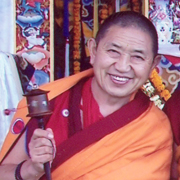
|
the REJOICE section ( 4th time )
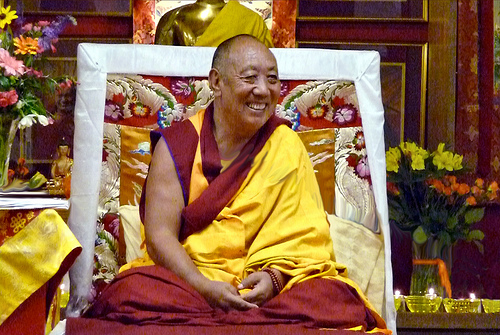 Gyudmey Khensur Lobsang Delek
Khensur Lobsang Delek, the seniormost disciple of our late Teacher, Gyudmey Khensur Dorje Tashi, has agreed to be resident ( at least half a year !! ) in Phuntsok Choling, CAS's Malacca centre !!
This is an unspeakable, unbelievable scenario as Rinpoche is also known as "Geshe Uma Gyukpa", literally meaning the Master of the Pinnacle of the Great Madhyamika, who teaches almost everyone of the 5,000 monks in Sera Je !!
CAS & Phuntsok Choling could die of impossible honour given that Sera Je will now lose one of their truly foremost monastic masters to undeserving students here !!
This will never be possible if not for our late Teacher, Khensur Dorje Tashi: "Rinpoche, always and forever our gratitude !!"
Many details need to be ironed out perfectly, including the renovation, the visas, the translator etc. Let's pray and hope that our good karma is seriously strong enough to host this one of Gelugpa's seniormost lineage-holder.
MY DEAREST KUNGA NYIMA LA @ CAS,
LOTS OF TASHI DELEK!! VERY SORRY FOR MY LATE REPLY. HERE, KHENSUR RINPOCHE'S ACCEPT YOUR REQUEST COMING TO YOUR CENTER FOR STAY SIX MONTHS OF EVERY YEAR. BUT NEXT MONTH WE HAD PLAN TO VISIT AT USA FOR TWO OR THREE MONTHS. AFTER WE WILL COMING SOON TO YOUR CENTER. SO DON'T WORRY. WARM WISHING YOU ALL THE BEST. PAY MY WARM TASHI DELEK TO YOUR CENTER MEMBERS. YOURS FAITHFUL LOBSANG TENDER _______________________________________________________________________________________________________________
the REJOICE section ( 5th time )
Thanz for articles u sent:)
John Ng
_______________________________________________________________________________________________________________
the REJOICE section ( 6th time )
PLEASE FIND THE PROGRAMME FOR INAUGURATION OF THE STUPA IN LADAKH.
ANYONE IS MOST WELCOME TO COME TO LADAKH FOR THE OPENING CEREMONY OF THE GREAT BODHISTUPA.
Khenpo Konchok Rangdol (Principal Kagyu College) Kagyu College P.O. Kulhan Sahastradhara Road, Dehra Dun-248001 (U.K.) India Ph: +91 135 6534398 Mobile:+91 9837258952 E-mail:khanporangdol@rediffmail.com website:www.visionhimalaya.net www.drikung-kagyu.org www.dharmakirti.de www.treasurehimalaya.eu Face book id is: Khenpo Rangdol Bodhistupa
Inauguration Drigung Kagyud Tserkarmo Monastery Tingmosgang Village, Ladakh Tentative Schedule Monday, 25 July 2011—1 August 2011 Sri Chakrasamvara practice-offering retreat (drupcho) and fire puja and reading
of the whole Buddhist canon for the steadfastness of the Buddhadharma Monday, 01 August 2011 Arrival of H.H. the Drikung Kyabon Chetsang in Tingmosgang (from Phyang) Tuesday, 02 August 2011 Formal consecration of the new temple and the facility based on the Sri Chakrasamvara
sadhana, presided over by His Holiness Wednesday, 3 August 2011 (Great Wheel of Dharma Day) AM: Formal inauguration of the stupa PM: Celebration of His Holiness’s birthday Thursday, 04 August 2011 AM: Teachings on the Four Dharmas of Gampopa by His Holiness PM: Presentations of cultural songs and dances Friday, 05 August 2011 AM: Teaching and empowerment of the Fivefold Path of Mahamudra by His Holiness PM: Teachings on the practice of Great Drikung Phowa by H.E. Togden Rinpoche Saturday, 6 August 2011 AM: Long-Life sadhana practice by the ordained sangha, followed by the Phowa transmission
by His Holiness PM: Long-Life empowerment by His Holiness, followed by offerings and prayers for
the long life of His Holiness and a public audience with him Special Note: As August 6th is the anniversary of the flash floods in Ladakh, in the evening,
His Holiness will preside over a hundred thousand ganacaka and lamp offerings,
followed by aspiration and dedication prayers for those who lost their
lives in this tragedy Sunday, 7 August 2011 AM: Guru yoga ganachakra offering led by His Holiness, followed by a talk by His
Holiness entitled “A Meaningful Life” for foreign disciples PM: Picnic lunch for foreign disciples with His Holiness _______________________________________________________________________________________________________________ |

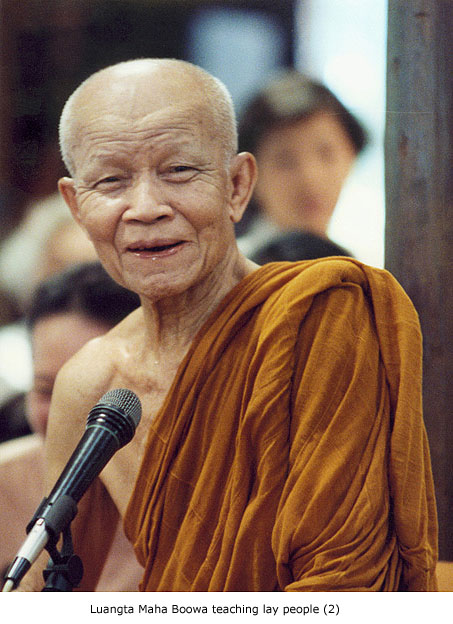
As soon as I fell asleep, though, I dreamed that I was floating high in the sky above a large metropolis. It wasn't Bangkok, but I don't know what metropolis it was. It stretched as far as the eye could see and was very impressive. I floated three times around the metropolis and then returned to earth. As soon as I returned to earth, I woke up. It was four a.m. I quickly got up with a feeling of fullness and contentment in my heart, because while I had been floating around the metropolis, I had seen many strange and amazing things that I can't describe to you in detail. When I woke up, I felt happy, cheerful, and very pleased with my vision, at the same time thinking to myself that my hopes were sure to be fulfilled, because never before had I seen such an amazing vision — and at the same time, it had coincided with my vow. So that night I really marveled at my vision. The next morning, after my meal, I went to take leave of the senior monk who was in charge of the monastery, and he willingly gave permission for me to go....
In May of that year, 1942, I left Nong Khai for the town of Sakon Nakhorn, and from there went on to the monastery where Ven. Acariya Mun was staying in Baan Khoak, Tong Khoam Township, Muang District, Sakon Nakhorn Province. When I reached the monastery, I found him doing walking meditation in the late evening dusk. 'Who's that?' he asked, so I told him who I was. He then left his meditation path and went to the meeting hall — he was staying in a room there in the meeting hall — and conversed with me, showing a great deal of kindness and compassion for the incredibly ignorant person who had come to seek him out. He gave me a sermon that first evening, the gist of which I'll relate to you as far as I can remember it. It's a message that remains close to my heart to this day....
I felt an immediate sense of faith and conviction in him as soon as I saw him face to face that night, both because of my conviction in the Dhamma he was so kind to teach me, and because of the assistance he gave in letting me stay under his guidance. I stayed with him with a sense of contentment hard to describe — but also with a stupidity on my own part hard to describe as well. He himself was very kind, helping me with the Dhamma every time I went to see him....
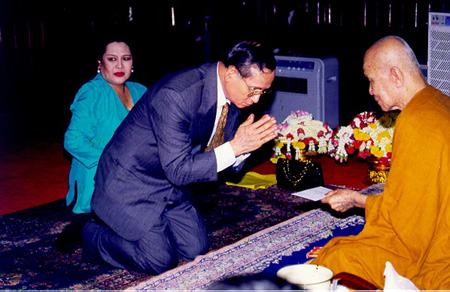
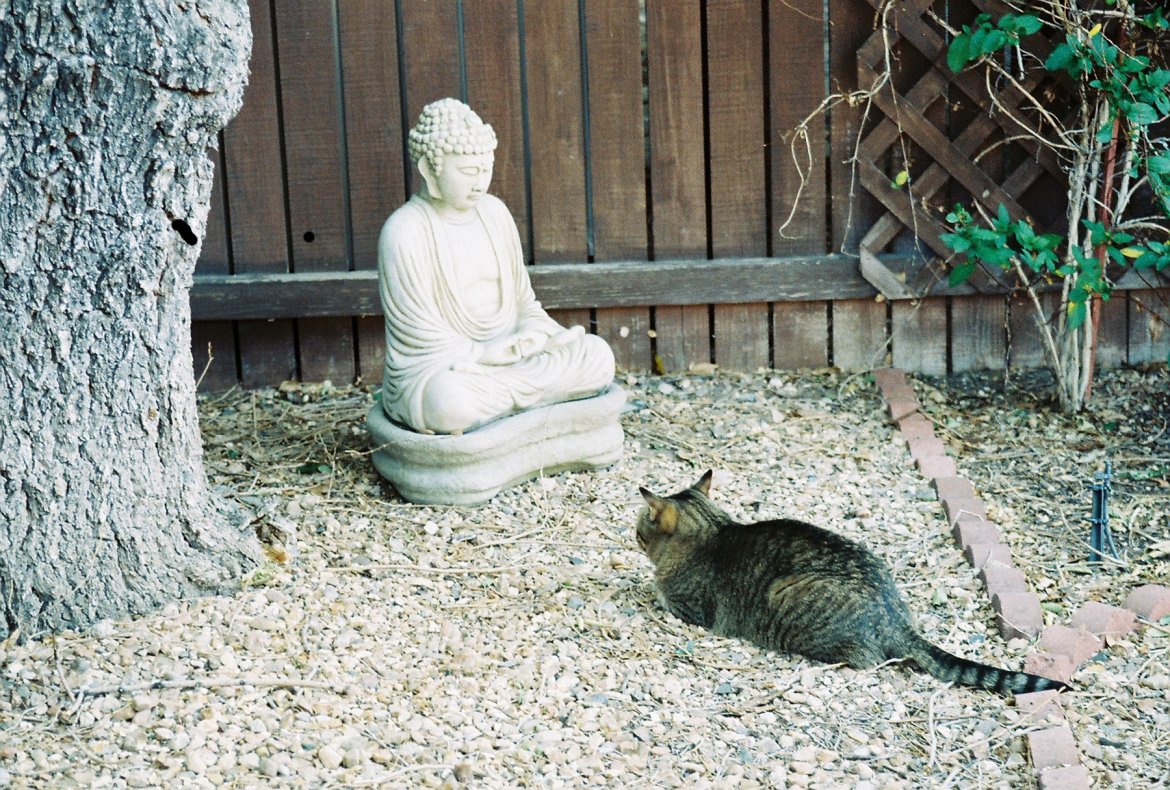
The North and North-east of Thailand where thudong monks used to wander were sparsely populated. Paved roads were few. Vast tracts of the land were covered by forests that were home to elephants, tigers, clouded leopards, black panthers, bears, wild buffaloes, boars and snakes. These animals ruled not only the wilderness but also the fears and fantasies dwelling in every monk's and villager's imagination. As Ajahn Mun told his disciples, until the monk actually faces these beasts, he will never know how much or how little he fears them....
The tiger occupies a conspicuous place in monks' accounts of their life in the forest. The monks regarded this animal with a mixture of fear and respect. Fear of tigers and the vivid imagining of oneself being devoured by tigers often drove the mind to one-pointed samadhi (concentration).
Samadhi, a thudong master explains, 'is a gathering of the mind's energies so that they have great strength, able to uproot attachments and to cleanse the mind so that it is, for the moment, bright and clear'. Any of the 40 meditation methods that the Buddha taught could, if practised seriously, bring the mind to samadhi. ....
In the early stage of his training, a monk or novice stayed with his teacher; he participated in daily rituals, received instruction, and learned by observing. During this stage the disciples depended on the teacher for inner guidance. If a monk was afraid of tigers, Ajahn Man sometimes put him deep into the forest, at some distance from the other monks....
He was defenceless except for his mind, which could fix itself on a theme of meditation or a recitation of 'Buddho' until, as Ajahn Mun said, the mind became 'absorbed in Dharma'. Ajahn Mun's theory was that at such a critical moment, strong concentration would develop or deepen, and further wisdom or insight would occur. In the battle between fear and Dharma, as Man's biographer observes, 'If the fear is defeated the mind will be overwhelmed by courage and enjoy profound inner peace. If fear is the victor, it will multiply itself rapidly and prodigiously. The whole body will be enveloped by both a perspiring heat and a chilling cold, by the desire to pass urine and to defecate. The monk will be suffocated by fear and will look more like a dying than a living man'....
.... as they were walking along a forest trail parallel to the Mekong River, Fan spotted tiger tracks and droppings, some of them recent. As dusk was falling, they heard the snarling and growling of tigers ahead and behind them. To keep calm, Fan and the novice meditated while walking but they had difficulty concentrating. They were afraid a tiger would attack at any moment.
..... He thought, 'A monk who is afraid of wild animals is not an authentic thudong monk ( meditating monks in the forest ).' He reassured his nephew: 'When we have mindfulness, the mind is at peace. It's not afraid of danger. Even if we're devoured by a tiger, we will not suffer.' As it turned out, Fan and the novice saw no tigers on this trip....
In 1925 Fan spent five days meditating alone on a mountain. One day, while walking uphill, he was startled by an unusual noise. It sounded like a big animal digging in the ground. As the thought of a tiger entered his mind, he froze. Although the encounter was sudden, Fan's quick reaction indicates his strong mindfulness:
Within seconds he concentrated his mind so it wouldn't react to the situation. The animal raised its head out of the thick brush. 'It's a tiger alright,' he thought, 'and judging from the size of its head it must be huge'. Seeing the beast he felt a chill run up his spine. Sweat broke out on his face. Intuitively he knew that if he turned his back and started running he would be killed. The tiger would certainly attack. So he focused his mind to face the critical situation calmly, even though his breathing was not as relaxed as usual. The tiger took one glance at him, gave a loud growl, and leapt into the forest.
........ Once while wandering in northern Siam, Chaup was approaching a great forest when he met some villagers who invited him to spend the night in the village and continue his journey the following morning. They warned him that the forest was large and ferocious tigers inhabited it. If he entered it that afternoon, night would catch him there. Tigers had killed travellers who had spent the night in the forest, they said. But despite their concern, Chaup insisted on going. He believed if he became a tiger's meal, then that was his karma.
Travelling alone, Chaup was able to take acute notice of his environment. He had not gone far when he came across tiger tracks and saw both fresh and old droppings everywhere. So he fixed his mind on his recitation while walking. At nightfall, when he was still in the middle of the forest, he heard two tigers growl. As they moved nearer their roars became deafening. Suddenly a tiger emerged on the trail walking toward him. Chaup stopped, turned, and saw another tiger approaching from behind. Each moved to within two metres of him. They were the biggest tigers he had ever seen. Each of them looked as big as a horse, its head about 40 centimetres wide. Seeing no way out, Chaup stood motionless, his feet frozen, thinking this was to be his end.
At that critical moment, mindfulness came to his rescue. Determined not to abandon mindfulness even though he might be killed, his mind withdrew from the tigers, dwelt within, and became one-pointed. Intuitively Chaup then knew that the tigers could never kill him. In an instant he was oblivious to the tigers, to his body, and to everything around him. His mind withdrew completely into a deep concentration and remained there for several hours. When he emerged from his samadhi, he found himself standing on the same spot, with the klot on one shoulder and the alms-bowl in its sling across another shoulder; the lantern was still in one hand but the candle long since out. He lit another candle, but no tigers were to be seen. The forest was quiet.
Chaup was surprised that he was still in one piece, untouched by the tigers. His mind was filled with courage and compassion. 'He felt that he would be able to face hundreds of tigers, now that he knew the power of the mind. He felt great love for those two tigers, who were really friends in disguise, for having "lifted" him to the Dharma and for helping him to realise its wonders.' Chaup's life may have been saved by his ability to concentrate deeply, which allowed him to stand still for several hours.
.... The experiences of these thudong monks who survived in the wilderness confirmed their belief in the power of the Dharma. As Achariya Mun told his disciples, 'From such a mind an attacker will draw back, be it a tiger, a snake, or an elephant. The aspirant may even be able to walk right up to it. His attitude toward animals is based on metta (loving- kindness), which has a mysterious but real and profound influence. It is true that animals do not know this, but they can feel and sense it. This is the power of Dharma which gives protection to the aspirant, meanwhile softening or neutralising the ferocity of the animals. This is the mysterious power of mind, which is self-evident but is still difficult for others to realise who have not yet developed to the same level.'
Dangerous animals seem to have an inexplicable forbearance toward forest monks. The monks themselves were often surprised that wild beasts, supposedly fierce, did not harm them. In Phuang's view, 'Tigers never attack thudong monks. Often a tiger will just stalk past a klot or quietly lie down beside it, so close that the monk can hear its heavy breathing. The tiger simply ignores the monk.'
To ordinary people, the practices adopted by thudong monks might seem unnecessarily risky, but from their teacher's perspective living in the forest was indispensable to spiritual liberation. The monks' belief in the merit of their thudong practice set them apart from those who followed the scholarly path urged by the monastic authorities in Bangkok. It led them to accept risks willingly, even the risk of death. As Man told his disciples: 'The Dharma is on the other side of death. Without crossing that threshold there can be no hope of realising that Dharma.'
Extracted from 'Forest Recollections' by Kamala Tiyavanich, published by University of Hawai'i Press
______________________________________________________________________________________________________________________
the DALAI LAMA section !!
His Holiness the Dalai Lama honoured for iconic contribution to peace, social justice
Tibet.Net
19 November 2010
New Delhi: His Holiness the Dalai Lama was honoured with the Mother Teresa Memorial International Award for Social Justice by the Harmony Foundation at a ceremony held at the Taj Mahal Hotel yesterday.
Speaking on the occasion, Dr Abraham Mathai, president of Harmony Foundation and Vice Chairman of State Minorities Commission, Government of Maharashtra said the Award honours His Holiness as “a living legend, a worldwide icon of conscience, a voice clearly heard over the din of conflicting values, and as a global voice for peace and social justice.”
In his acceptance speech, His Holiness recalled his first visit to Mother Teresa’s center in Calcutta where he said he was touched by the spirit of Mother Teresa which was still alive even in her absence. “And that’s very important because even if she’s not there, her followers are still fully committed in continuing her legacy in serving the poor and the destitute,” His Holiness said.
His Holiness said all major religions have the same potential to cultivate and strengthen human values such as compassion, forgiveness, and tolerance. Mother Teresa, His Holiness said, was a Catholic nun whose inner strength came from her Christian faith. Faith not only brings individual well-being but also the willingness to serve others, His Holiness added.
Speaking on the importance of cultivating inner values, His Holiness said material values have its own limitations as it provides only physical comfort. But a calm and compassionate mind brings inner well-being.
His Holiness said by and large many religious traditions have peacefully coexisted in India which he said was due to ancient Indian traditions of religious harmony and Ahimsa (non-violence). Arguments and debates happen between different viewpoints but that’s understandable, His Holiness said.
His Holiness expressed his admiration for other award winners of the day saying their selfless and tireless commitment and dedication towards bringing justice and securing rights of the less privileged will go a long way in bringing development and change in India. But real transformation, His Holiness said, should begin from rural communities in India.
The award was presented to His Holiness by two representatives from the Kolkata-based Sisters of Missionary, and actress Rani Mukherjee who said she felt extremely privileged to be in the same room as His Holiness as “only a chosen few get blessed by His Holiness.”
The Harmony Foundation also honoured a host of other NGOs and individuals for their contribution toward peace, tolerance, equality, and social justice. Among them were Aruna Roy and her organisation Mazdoor Kisan Shakti Sangathan for Right to Information and empowerment of women and rural poor; Roy was a prominent leader of the Right to Information (RTI) movement which led to the enactment of the RTI Act in 2005.
Mr Colin Gonsalves, a senior advocate of Supreme Court of India for legal aid in addressing human rights; Sewa Ashram, an NGO for their work amongst the homeless destitute in Delhi; Dr Udit raj for Dalit empowerment and emancipation; Mr Y.P. Singh for his campaign against corruption in upper echelons of public service especially in the police and income tax departments; Ms Sumaira Abdulali for advocacy on noise pollution and environment. And Sayed Iqbal Haider, a former senator, federal minister of law and former attorney general of Pakistan was honoured for his activism in human rights.
Luminaries from the public life who attended the award ceremony included Justice J S Verma, former Chief Justice of India and Chairman of National Human Rights Commission; GVG Krishnamurthy, former Chief Election Commissioner; Dr T Sangliani, vice chairman of the National Commission for Minorities; Members of Parliament Milind Deora, Jose K Mani, Dr B Mungekar and Sanjay Patil; Tushar Gandhi, great grandson of Mahatma Gandhi; and Swami Agnivesh.
International guests at the awards included H.E. Mr Ahmad Tariq Karim, High Commissioner for Bangladesh; H E Mrs Khadija Radman Mohammed Ghanem, Ambassador for Yemen; Deputy head of delegation of the EU, Mr Pavel Svitil; Deputy Chief of Mission for Germany, Mr Christian-Mathias Schlaga; Deputy Head of Mission for Austria, Mr Raimund Magis of Austria; and Secretary Nathanael Silva of Brazil. Indian film director and noted human rights voice Mahesh Bhatt was also present.
---------------------------------------------------------------------------------------------------------------------------------------------------------------
Jamia Millia Islamia honours His Holiness the Dalai Lama with Doctorate degree
---------------------------------------------------------------------------------------------------------------------------------------------------------------
Tibet.Net
24 November 2010
New Delhi: His Holiness the Dalai Lama was conferred the honorary degree of Doctor of Letters (Honoris Causa) by Jamia Millia Islamia, a prestigious national university at its annual convocation ceremony held on the lawns of Dr M A Ansari auditorium on the university campus on Tuesday.
The chief guest on the occasion, Mr Kapil Sibal, Union Minister of Human Resource Development and Mr Najeeb Jung, Vice-Chancellor of Jamia Millia Islamia conferred the degree on His Holiness at a function attended by thousands of graduating students, faculty staff, and other eminent personalities.
The citation reads, “Jamia Millia Islamia honors His Holiness the Dalai Lama of Tibet, one of the most respected figures and teachers of our times, who stands for rationality, humanism, non-violence, peace and universal benevolence, with the degree of Doctor of Letters.”
The citation further notes that His Holiness’ “message of compassion, altruism and peace has made him a statesman of our troubled times,” and adds that His Holiness “has led the Tibetan refugees in a remarkable success story where even after more than 50 years in exile, the [Tibetan] community has been able to retain its unique identity and remain welcome by their hosts.”
In his remarks, His Holiness said he felt extremely honored to receive a Doctorate degree from a well-known Muslim university in India adding one of his two commitments is to promote religious harmony among different religious traditions. His Holiness said Islam is one the most important world religious traditions that provides hope and inspiration to millions of its followers.
When the 9/11 incident happened in New York, he said he stood firmly in defence of Islam because he believed it was “absolutely wrong” to view all Muslims through the acts of a few mischievous people. “And a few mischievous people creating trouble is always there in any religious tradition whether Muslim, Hindu, or even Buddhists,” His Holiness said.
In Lhasa, a small Muslim community who first came to Tibet as traders co-existed peacefully with the dominant Tibetan Buddhist community for centuries, His Holiness said. “There is no record of Muslims fighting with Tibetans in Lhasa.”
Mr Najeeb Jung, Vice-Chancellor of the university in his annual convocation address called His Holiness “the true inheritor in the contemporary world of the message of peace and non-violence pioneered by Mahatma Gandhi.”
Mr Jung said His Holiness through his steadfast commitment to the power of non-violent persuasion has restored the world’s faith in the relevance of moral critique. By his presence alone, Mr Jung said, His Holiness has made India a better place.
“The presence of His Holiness reminds us that India is the birthplace of many great faiths and home to all of them. Many great Buddhist teachers journeyed to Tibet in the 8th century to preach Buddhism and it is wholly appropriate that His Holiness should return to India to remind India of its Buddhist heritage and the rich diversity of its religious traditions,” Mr Jung said.
Addressing the graduating students, the Vice-Chancellor said, “It is a special moment that you step out in the world blessed by true Holiness, by an individual who embodies the best in humanism within a modern mind.”
Union Minister Mr Sibal in his address said in keeping with its secular traditions, Jamia Millia Islamia have chosen to honour His Holiness, a “noble soul who is the personification of the virtue of equanimity in pain and pleasure, being steadfast when changes around have been large and intense.”
Prince Salman Bin Abdul Aziz of Saudi Arabia, Palestinian-American literary theorist and intellectual Edward Said, eminent Urdu writer Ismat Chugtai, and renowned scholar of classical Indian dance, art and architecture Dr Kapila Vatsyana are some of the past recipients of the honorary degree of Doctor of Letters.
A total of 3,529 degrees and diplomas was awarded to students who have successfully completed post-graduation, graduation and diploma from different faculties, departments and centers of the university.
Established in 1920, Jamia Millia Islamia is historically counted as among the most important national institutions in India today. It is a pluralistic university closely linked to Muslim contributions in India’s struggle for nationhood.
------------------------------------------------------------------------
Countering Stress and Depression
the BOOK section !!
ABOUT THE BOOK
KNOW THYSELF, My Eightfold Path to Health
Throughout the ages philosophers and pre-eminent thinkers have sought to guide and teach us about ourselves. From Socrates in the West to Buddha in the East their teachings and practices were centred upon the simple principle of Know Thyself. They were aware of the importance of the connection between ourselves and the world in which we live existing in multiple levels. In the modern era we have tended to become preoccupied with the materiality of our existence, undervaluing if not forgetting the contribution to the essential well-being of our thoughts, our emotions and our spiritual nature.
Each of us has the inherent desire to lead a happy and fruitful life. Yet how many of us are able to say that we have achieved this? Self awareness on an emotional, mental, spiritual as well as physical level has long been the key to understanding and creating a better more fulfilling life for ourselves and those with whom we interact.
My Eightfold Path to Health is your invitation to balanced health, personal growth and spiritual development.
Self awareness is the key to our health on so many levels. My Eightfold Path to Health is a step-by-step guide relating my own experiences to assist with the development of personal awareness of the requirements to maintain optimal health and well-being of mind, body and spirit.
Based upon eight simple steps you develop your own understanding of yourself through personal reflection. Who do you feel yourself to be? What are your beliefs and values? How is my health affected by my thoughts, my words and deeds? Does my choice of livelihood impact on my health? How much effort must I put into this process to achieve results? Why must I focus my newfound mindfulness on those issues that have come to my attention? What happens when I finish the Path?
By learning about yourself and monitoring your interaction with the world around you, you are best able to satisfy your needs for a more balanced approach to spiritual, emotional, mental and physical health.
WHERE TO BUY THE BOOK ON-LINE:
AMAZON BOOKS
TRAFFORD PUBLISHING
Available Online: www.trafford.com
Email: orders@trafford.com
Know Thyself, My Eightfold Path to Health ISBN: 978-1-4269-0863-7
(Available in eBook, soft cover & hard cover)
tELL A fRIEND
"KNOW DHARMA; SHARE DHARMA !!"
Be part of our thousand++ "Friends @ CAS" ( that belongs to Chenrezig & other holy beings )
xxxxxxxxxxxxxxxxxxx
"I wanna number my days in samsara. sUBSCRIBE mE NOW !!"
Email contact@casotac.
____________
See www.casotac.
CASonline - Your Buddhist online news and teachings.
( All online articles lovingly archived at http://www.casotac.